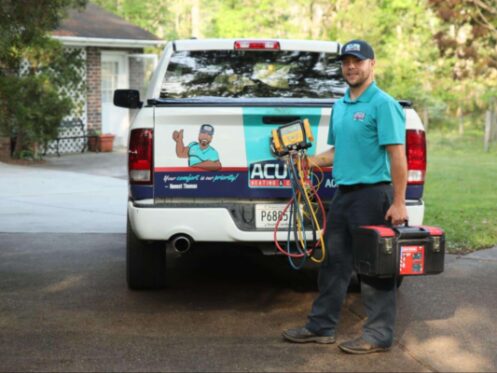If you’re in the market for a new heating system, you have many different options to choose from. Two of these options are an electric-powered furnace and a heat pump. Understanding the differences between the two will help you to determine which one is best for your home.
How Does an Electric Furnace Work?
Put simply, an electric furnace relies solely on electricity to produce heat for your residence. It does this by pulling air into its internal heat exchanger. In this heat exchanger, there are electric heating elements that warm up the air. Your furnace’s blower will then force the hot air through your ducting and into the rooms of your home. At the same time, it will pull cool air into your ducting to be reheated. An electric furnace will be controlled by your thermostat, and it will continually run until it warms your home up to your desired setting.
How Does a Heat Pump Work?
It’s easiest to think of a heat pump as a heat transfer system. It does not produce heat as an electric furnace does. Rather, it has a substance called refrigerant that is responsible for the transportation of heat. During the winter months, refrigerant in your outdoor compressor unit will attract heat from the air outdoors. The compressor will force the refrigerant into your home through copper tubing. When it reaches the inside of your home, the refrigerant will release its heat, and the blower will force the hot air into the various rooms throughout your house.
Many homeowners are surprised to learn that a heat pump will be able to pull heat from the air outside at temperatures below 20 degrees Fahrenheit. However, when temperatures dip down below freezing, your heat pump is going to become less efficient. Eventually, your heat pump is not going to be able to remove heat from the outdoors, and its auxiliary heating system will kick on. Auxiliary heating on a heat pump is very similar to that of an electric furnace. It has internal electric heating elements that warm up the air that is then supplied throughout your home.
Pros and Cons of an Electric Furnace
One of the biggest advantages of electric furnaces is that they tend to be the cheapest type of furnace to install. They are very easy to operate and don’t require any sort of fuel hookup. Since this type of system only operates on electricity instead of gas or oil, you don’t have to worry about any of the safety concerns like exhaust fumes that come along with burning other types of fuel. Electric furnaces are also a great option for homes where there isn’t any other fuel source readily available.
Just like any sort of heating system, an electric furnace does have some drawbacks. First and foremost, it is relatively expensive to run this type of furnace as compared to a heat pump or a gas furnace. Additionally, if the power goes out to your home, you will also lose the ability to heat it.
Pros and Cons of a Heat Pump
One of the biggest advantages of running a heat pump in the wintertime is that it will use less energy than an electric furnace when it’s operating at normal temperatures. This can go a long way toward saving you a bundle of money when it comes to heating your home during the winter months. Additionally, a heat pump also works to cool your home during the hot summer months. This will save you the trouble of having to purchase a centralized air conditioning system to cool your residence.
As with any purchasing decision, it’s important that you also understand the cons of choosing a heat pump. With this knowledge, you can weigh which option is best for your home. When you look at the price tags associated with heat pumps, you’ll notice that they’re much more expensive than electric furnaces. It’s also important to realize that the energy efficiency heat pumps can offer only applies down to a certain exterior temperature. When it gets too cold outside and your heat pump goes into auxiliary mode, it will match the efficiency level of electric furnaces.
Expert Heating Service
At Acute Heating & Cooling, we offer expert heating service for Summerville, SC and the surrounding communities. We can also help with all of your cooling, ductless mini-split, heat pump, water heater, indoor air quality, and commercial HVAC needs. Call us today to get the expert help that you need with your home.



